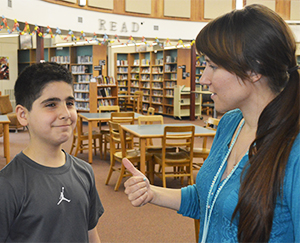It’s notoriously difficult for a student to adjust to a new school in the middle of the year. For a student from Iraq who can’t speak English, the usual becomes a lot harder.
That was the situation facing sixth-grader Andrew Shmona when he arrived at Kenowa Hills Middle School in November. Although he had studied English in his Iraqi school, he could barely speak or read it. One teacher put labels on the objects in his classroom so Andrew could learn their names.
But by the time he finished school in early June, the labels had been taken down. Andrew earned A’s in math and social studies, and B’s in language arts and science. He could write in English and speak in complete sentences – even to a reporter who made him a little nervous.
“I am learning,” Andrew said, with a shy grin.
Andrew learned much in his first year here. That was thanks to teachers and aides who worked intensively with him, other students who helped him and his own determination. As one of Kenowa Hills’ English-language learner students, he took advantage of special supports set up to help children like him succeed.
Shortly before school let out for the summer, Robert Stehouwer, his math teacher, remarked on the impressive progress Andrew had made since he had posted the labels in the classroom for him.
“It is really amazing to see how far Andrew has come with his learning of the culture and language,” Stehouwer said. “We have even been having fun learning American idioms. I think his favorite is ‘piece of cake.’”
Learning to learn in an American school, however, was no piece of cake for Andrew.

Going from Arabic to English
He came with his family to join relatives who had settled in the area. His father, an electrical engineer, and mother also brought their two daughters, now at Alpine Elementary and Kenowa Hills High School, and a son in his early 20s.
Andrew was not entirely unfamiliar with U.S. culture. He liked sports, loved to draw, played video games like “Minecraft” and knew his formulas in math.
But learning English was a different story. He could read and write in Arabic and spoke Chaldean, the language of an Iraqi Catholic minority group to which his family belongs. But his English lessons back home did not prepare him for full-on American schooling. For one thing, he had to learn to read from left to right, not right to left as with Arabic.
Fortunately for him, help was available from Alicia Lorenzo and Ashley Rowe, paraprofessionals who work with English-language learners. Lorenzo spent Mondays, Wednesdays and Fridays with him, and Rowe Tuesdays and Thursdays, helping him make sense of classroom lessons and tutoring him in English.
He was game to learn from the outset. Lorenzo recalled with a laugh the first full sentence he spoke: “I like to play Minecraft every day.”
An ally in her teaching was Google Translate, a free program that enabled Andrew to read English texts in Arabic. Using his phone and a Google Chrome Book, he took a photo of a page, scanned it and then clicked “translate” to read it in Arabic.
Students Helped Him Out, Too
The method helped him make a PowerPoint presentation on the Incas, how they ate and built houses. He read a portion of it aloud for a visitor: “They hold the rocks together with mud. They paint them because they want them to look nice.”
Lorenzo also had him record himself reading “The Book That Ate My Brother,” and keep a log of his progress. She recorded herself reading the book, too, so he could hear the proper pronunciations.
She also sat with him in class to help him understand questions, tests and homework directions. Gradually, he needed Google Translate less and worked on his own more.
“Now he can understand quite a bit, so he can be more independent and responsible,” Lorenzo added. “He’s come really far.”
Stehouwer, his math teacher, invested time in Andrew as well. He took him on a tour of the school when the boy first came so he knew his way around. He also assigned a student to be his buddy and support him outside of class.
”Think about being a 12-year-old kid who cannot communicate with your peers or teachers,” Stehouwer said. “I wanted Andrew to know that we would look out for him and make sure he was comfortable here at school.”
Classmates took an interest in Andrew and communicated with him via computer. Helped by them and his supportive family, Andrew became “an outstanding student who has a true passion for learning,” Stehouwer added.
That was evident when Andrew spoke of a science assignment he completed about plate tectonics. He said proudly, “I got a 93.”
CONNECT









